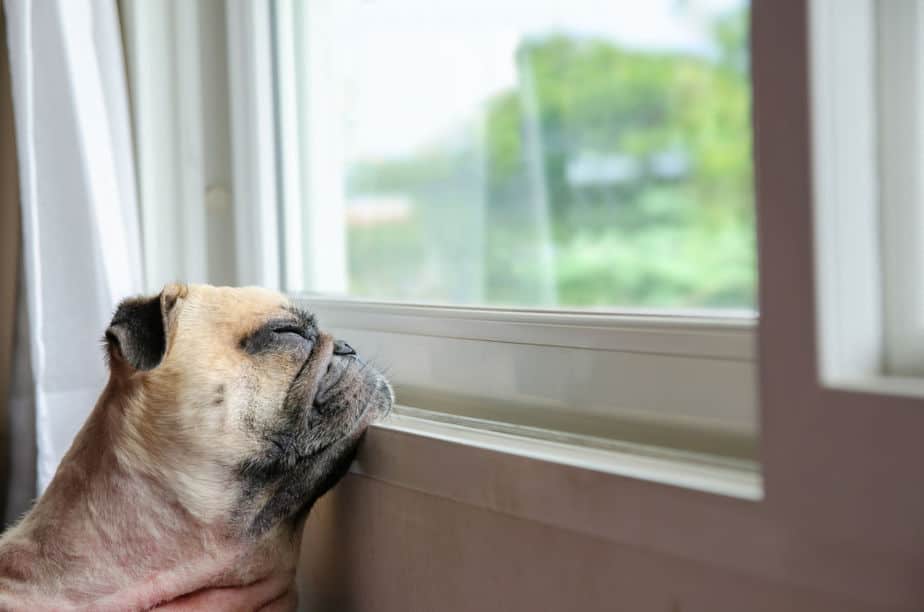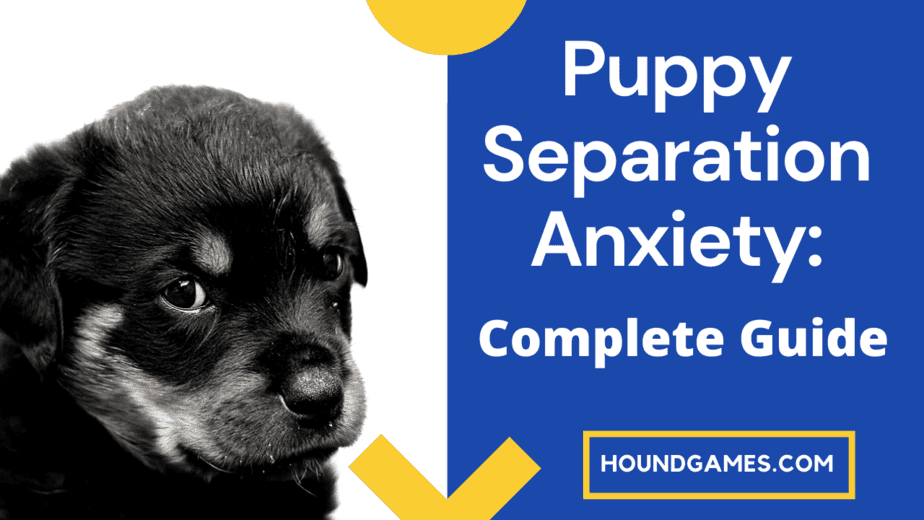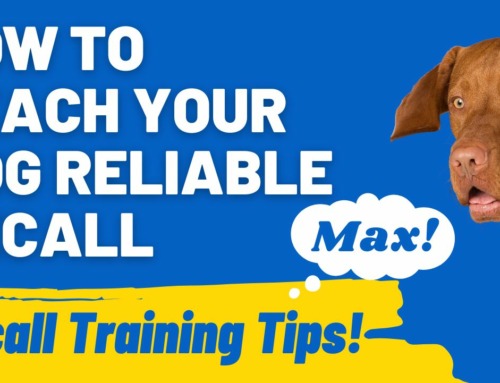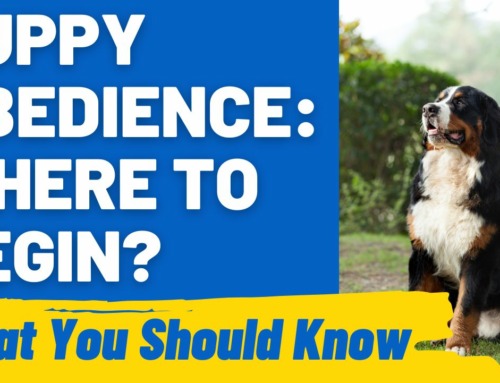When a puppy, or any dog for that matter, has separation anxiety, it can be extremely upsetting to everybody involved and the results can be quite destructive. Even signs of puppy separation anxiety at night can lead to sleep disturbances, as your puppy may bark, cry, howl, or whine for hours.
Puppy Separation Anxiety: A Complete Guide
Since puppy separation anxiety can cause massive disruptions in the home, this problem must be addressed early on. Every puppy owner needs to know how to identify it by recognizing the signs and symptoms.
By knowing the early signs of separation anxiety in puppies, we can learn how to get rid of their anxiety for good.
Signs of separation anxiety in puppies
Signs of puppy separation anxiety can include whining, crying, indoor defecating and urinating, destructive chewing, licking, digging, excessive panting, hiding, and trembling. Signs of separation anxiety can be distinguished from non-separation anxiety by the fact these behaviors occur when they are left alone.
A test to determine separation anxiety is to watch your puppy for a trigger, such as picking up your car keys or putting on your work shoes. This is usually about fifteen minutes before you leave the house. However, it may also start up to thirty minutes after you have already left.
The symptoms of separation anxiety should also stop once you have returned home.
Suppose your puppy shows signs of separation anxiety such as whining, crying, urinating in the house, or destructive chewing while you are present. In that case, there are other causes for this behavior, and you’re not likely dealing with separation anxiety.
Whining and crying can happen for various reasons other than separation anxiety.
If your puppy’s crying and whining are driving you mad, you can also look at our posts, Puppy Cries and Whines in the Morning, Puppy is Crying at Night, or Why is My Puppy Crying?.
But what does separation anxiety in a dog look like?
The exact symptoms differ from puppy to puppy.
Signs of separation anxiety in dogs include:
- Excessive vocalization such as whimpering, crying, barking, or howling
- Heavy panting
- Digging at “escape” areas such as windows or doors
- Chewing or ripping apart items
- Pooping or peeing in the house
- Licking or even chewing on themselves
- Extreme restlessness or agitation
- Hiding
- Trembling
As you can see, separation anxiety can be both upsetting and cause major problems such as property damage. In severe cases, dogs have also been known to hurt themselves in their distress, so this problem must be properly addressed.
Do puppies naturally have separation anxiety?
To varying degrees, puppies have natural separation anxiety. Dogs are social animals, and to a puppy, being left alone is a natural source of stress. Some puppies are more independent, while for others, it can seem like the world is ending. This can also be dependant upon their breed.
Some puppies are more genetically predisposed to being anxious about being alone. On the other hand, having already being abandoned when left at a shelter can cause the problem.
Likewise, having never been alone before can cause separation anxiety to erupt, such as if you leave your puppy behind to take your adult dogs for a long walk without them.
For this reason, teaching a puppy to self-soothe and to be happy being alone for short periods is a critical part of their early development.
It can also take some time for your puppy to get to know you, especially if they’re a little older.
Puppy separation anxiety from litter or littermate
Separation anxiety over being separated from the litter is very intense for young puppies. For the first five or six weeks, while a puppy is still very young, being isolated and alone can translate into a life-or-death situation in their minds.
Their natural instinct is to either freeze, hide, or sound the alarm by howling their little hearts out. Usually, they opt for sounding the alarm.
Puppies don’t naturally explore too far from their whelping box or den until about five weeks old. They are used to staying close to each other for body warmth and comforting primal contact with other mammals (their siblings).
They also know to stay put so that they are present when mom arrives to feed them. Between four and six weeks of age, they will begin to explore their environment more. This is still a fragile and vulnerable time in their development, so being separated from their litter and mother will cause stress and anxiety.
Between eight and twelve weeks, your puppy should be mentally and emotionally robust enough to be separated from their litter and go to a new home. If possible, try to take a blanket that smells like your puppy’s littermate and mom, and have a pheromone dispenser ready.
The first separation will likely cause your puppy some distress, but most of them are so involved in the new experience, they may not react too strongly initially. That is, until nighttime, and they face their first night alone.
A final note on this topic: if you bought two puppies from the same litter, you might need to deal with littermate syndrome. In this case, the puppies become so attached that being separated can cause massive anxiety.
If you have littermates, make it a practice to separate them for short periods every day. Distract them with positive experiences during this time to acclimatize them to separation.
Remember, littermate syndrome happens because puppies are often left together for most of the day, and they naturally make each other their primary bond.
If you are an equally significant part of their lives, and you’re just as full of fun and positive experiences, they can extend that primary bond to you. This is often overlooked when preventing littermate syndrome.

Puppy separation anxiety at night
All puppies and dogs have a natural urge to sleep near their pack.
For a puppy who has just been removed from their litter and has to face the first night alone, this can be an extremely distressing experience. The day may be filled with activities and attention, leaving them to feel abandoned when the lights go out, and they suddenly are left alone.
Puppy separation anxiety at night can take various forms, from toileting inside out of frustration to digging at your bedroom door. Usually, it comes as a vocalization, such as howling and crying.
There are ways to avoid this completely, such as letting your puppy sleep close to you or close to another (friendly) pet. Even so, if it is still early days, you may need to accept a few days of restlessness and being woken up frequently as your puppy adjusts. Not to mention potty training.
In most cases, nighttime anxiety is simply a matter of patience. A blanket with the scent of their littermates might help, as might an Adaptil pheromone diffuser.
Playing music softly can help reduce your puppy’s stress as well and there are plenty of options on YouTube for this.
Another critical factor is making sure your puppy is tired when they go to bed and instilling a consistent routine from the beginning.
This means, by the time they go to bed, they should already have had many activities to reduce their energy levels.
Keep the activities controlled, as puppies can become overstimulated just like children, and this can leave their brains too wired to settle down to sleep.
A short walk, a little obedience training, or playing some indoor games and exercises that reward impulse control can help expend energy without overexciting your puppy.
Be prepared for some whining and crying, though. Remember, no matter how heartbreaking it is, fetching a crying puppy and placing them in bed with you will only teach them how to make sure they can always sleep in bed with you.
If you are happy to have your dog in bed with you, this is not a problem. But if it is not something you want long-term, do not allow it at all.
Why do puppies get separation anxiety?
Several factors may cause a puppy to develop separation anxiety. One study shows that two leading causes are a lack of exercise and hyper attachment to the owner.
So if your puppy or adult dog follows you everywhere and never lets you out of their sight, they are at a higher risk of separation anxiety. The same is true for a puppy that is not getting enough physical exercise and mental stimulation.
But these are not the only contributing factors. Aside from a lack of exercise and hyper attachment, other factors that may cause separation anxiety include:
- A dog living with only a single adult is 2.5 times more at risk than dogs from larger households.
- Having a history of being left alone for long periods
- Having stayed at a shelter or boarding kennels for awhile
- Moving homes
- Living in a small, urban environment
- The loss of another pet
It’s also important to note that puppies generally are more prone to separation anxiety because they are primed to raise the alarm if they feel abandoned.
If you are unsure how long you can leave your puppy alone, you can check out our article on leaving dogs home alone.
Do puppies outgrow separation anxiety?
Depending on the severity, a puppy may never outgrow separation anxiety. If it is a very mild case, and your puppy learns to feel secure in their daily routine, they may overcome it with time. However, puppies with more severe separation anxiety will need their owners to intervene and teach their dogs how to self-soothe and become more comfortable on their own.
Regardless, no puppy should be expected to spend excessive amounts of time on their own and our article on leaving dogs home alone will give you a good indication of how long is ok.
Dogs are very social animals, and extended isolation is not a natural state for them.
If circumstances force you to leave your dog alone for extended periods, invest in dog sitters or daycares to ensure that your dog’s natural needs for companionship and interaction are met.
How do you stop separation anxiety in puppies?
With more and more money being spent on pet products, more products are being produced to solve problems such as separation anxiety.
For instance, your vet may recommend antidepressants, while others may swear by CBD oil or pheromone collars.
Here is our list of proven products for managing dog anxiety.
We will discuss some of these therapies below. Still, the critical thing to remember is that treating the symptoms won’t necessarily cure your dog’s separation anxiety. To do this effectively, one needs to treat the root of the behavior.
Here are some practical steps to take to help your puppy deal with separation anxiety:
Step 1:
Increase exercise and mental stimulation. A tired puppy has less pent-up energy that can turn into anxiety. Try to take your dog for a walk or a run before you leave the house. Puppies will need to have limited structured exercise to avoid unnecessary stress on their growing bones, but playtime can also help keep them calm. You can read our complete guide to puppy exercise here.
Step 2:
Accustom your dog to the crate. Start this process slowly. Begin by throwing treats into the crate without locking them in. Gradually, let them get used to being in the crate through loads of positive reinforcement. (Be sure their crate is the correct size too and we cover this in this post: Puppy Outgrows Their Crate: (Crate too small? When to stop?))
Step 3:
Build the duration that your puppy can be in the crate. Begin by simply stepping away for a few moments, then briefly leaving the room, and then slowly go for longer and longer periods—relative to your dog’s age. Puppies should not be left in the crate for hours on end.
Step 4:
Keep crate time positive by keeping your dog busy with chewies or with a favorite puzzle toy. Here’s also a list of our favorite enrichment toys you can get for your dog.
Step 5:
Do not only use crate time when you are not home. Allow your dog to become used to the crate while you are sitting nearby as part of their everyday routine.
Step 6:
To prevent hyper attachment, it’s vital that your puppy learns to be okay on their own and that it’s rewarding to be on their mat. They don’t need to be under your feet in the kitchen or following you to the bathroom. For this, it’s helpful to teach them place training.
Step 7:
Ensure your puppy is properly socialized with a wide variety of experiences, especially between three and ten months of age. Research shows that this is an effective preventative measure against separation anxiety as it increases your dog’s confidence.
Step 8:
Keep your household routine stable. A puppy that knows roughly when you leave every day and when you come back is more likely to be secure. A consistent routine is critical for an anxious dog.
Step 9:
Do not punish your puppy. Just like with humans, punishment does nothing to stop anxious behavior. In fact, it will likely make it worse.
Step 10:
If you have been in the habit of making a fuss when you leave or come back, now is the time to stop. Any kind of fuss over leaving or returning increases excitement, which in turn will increase any angst your puppy feels.
Try to ignore your dog for at least ten minutes when you come home so that it no longer feels like a major “event.”
Finally, never accidentally reward a puppy for being anxious. Too often, we tend to get on our knees to cuddle and soothe our distressed pup.
But remember, dogs can’t speak our language, and to them, it can be a sign that we approve of their anxiety. This way, we can unknowingly reinforce it.
Instead of reinforcing the behavior, try something distracting instead, like a game of tug or fetch.
Alternative therapies for your puppy’s separation anxiety
Antidepressants for dogs
Some vets may prescribe medication for severe cases of separation anxiety. Some of these are the same medications we use for humans, such as fluoxetine.
If you choose to go this route, your dog should be closely monitored for side effects. Remember that medication can only treat the severity of the problem; it cannot treat the root cause.
It’s always better to build a sense of security in your puppy through the steps outlined above and desensitize them to being alone. Addressing the root causes is usually a better option long term.
If you feel your puppy is sad and depressed, you can read about what to do in our post Puppy is Sad and Depressed.
CBD oil
While CBD oil is surging in the marketplace as a cure-all for dog-related problems, there is no research that it is helpful for canine anxiety. There is only some research that suggests it can help with pain management in dogs with osteoarthritis. However, many owners swear that it helps their dogs deal with anxiety.
Calming supplements
Calming supplements are typically marketed to us owners according to what appeals to us, rather than what has passed any clinical trials. So, you will frequently see pet calming supplements with ingredients like lavender and chamomile, even if the supposedly calming element makes up less than 1% of the product.
The truth is that there is very little research concerning herbal remedies for dogs, so keep a skeptical eye on these products. There is also very little oversight of supplements, so what is on the label isn’t always in the bottle.
However, some research shows some nutrients and herbs, such as L-Theanine and St. John’s Wort, may be helpful. Therefore, VetriScience Composure Behavioral Health Bite-Sized Dog Chews may be helpful.
Adaptil Diffuser/ Pheromone collars
Clinical trials show that Adaptil diffusers do help with certain kinds of anxieties and phobias with dogs. So this may be beneficial as a supplementary treatment.
Music
A surprisingly helpful means to help combat the stress from separation anxiety is music. Apparently, alternating reggae and soft rock in the background while you are away can help calm your puppy down.
Final thoughts
Separation anxiety can be distressing for both owners and their dogs. It can be especially bad in frustrated working or herding breeds or in companion dogs that are bred to be close to their owners.
The good news is that with consistent desensitization and behavior modification, we can teach our puppies to gain the confidence to be fine on their own. And that, in turn, will give us the peace of mind we need when leaving the house.




